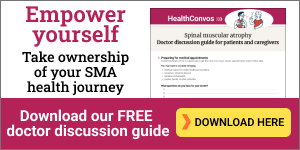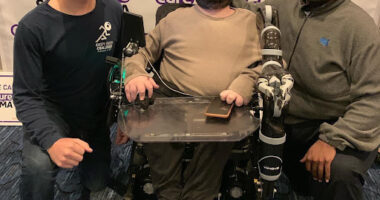
The patient-provider relationship: Building trust
Kevin Schaefer, who lives with SMA type 2, and neurologist Edward Smith, MD, discuss the importance of trust in building the relationship between the patient and the healthcare provider.
 Find a specialist near you
Find a specialist near you
Transcript
Kevin: Yeah, that’s a great question. And I think, you know, as I mentioned, that Dr. Smith was my neurologist for more than a decade, and we definitely have that relationship with each other. And definitely as someone who has been living with us, I mean, my whole life, you know, it definitely takes time to build. I don’t immediately trust every doctor. I mean, I, you know, at first impression is a big thing, but I think it does take time to really build that trust and and to have that open communication with each other. And there are myriad steps to that.
I think, you know, Dr. Smith, you said about having humility. I think that works both ways too, because there are going to be things about SMA and other neuromuscular conditions where both patients and providers don’t have all the answers and you’re kind of figuring out things as you go along. But when you have that trust for each other and you’re willing to ask each other questions and just like learn from each other, I think that goes a long way.
And you know, you and I definitely have that relationship over the years. And it does come down to just a number of factors. But when you’re willing to put your own assumptions aside, and you’re willing to just kind of like, tackle each issue from the perspective of okay, let’s figure this out together. I think that’s where it’s really important.
What do you think from the provider perspective?
Dr. Smith: I think you summed it up really nicely. I mean, every relationship is going to be different. There are some patients, some families who will come in and be super well educated on SMA, and others not so much. So the way I interact with those two in those two scenarios is going to be different. And that’s where it’s just important, I think initially to just try to get to know each other, where is the patient, where is the family in this journey?
And I think another thing would be — and not to be funny — but I mean, and this is a good rule, I think in general in life, but I mean, if you’re sitting across from someone who seems to have all of the answers to everything, you might wanna be a little bit suspicious. So, and maybe Kevin, maybe I’m more prone to say, I don’t know. I just, I don’t have a problem saying I don’t.
What I have a problem with is saying, I know. I’ve just been at it for too long. I used to think I knew a lot more, truly, about SMA. It’s just the longer you do this, the more you realize how much we just don’t know. And with everything, every new bit of information, we seem to learn about the condition or the treatments, you know, two new questions arise. And that’s not a bad thing; that’s just the reality of it.
I guess I’ve been at it long enough to know that what I might say I think I know today as being correct may not be entirely correct in five years or 1o years. That’s not to say that we don’t know anything and that there aren’t guidelines for care or science behind all of this and physiology; that’s all there. But I think the relationship, the back and forth, it’s really important to try to have that on an equal level, especially like with UCAT with an adult patient or an older patient or with the parents for the younger patients.
So that there’s, I think sometimes, not sometimes, I think many times or patients are afraid to question their doctor, that their doctor’s going to be offended by that. Or, you know, and if that may, I’m sure that happens. And if it does, you probably should find somebody else. That’s easy to say; there aren’t a whole lot of SMA specialists out there, but I think that’s a key component to this whole thing is being able to be on the same level in both directions and treat each other as not entirely as a patient and as a patient physician, but also human beings and with limitations, right?
I can learn much more about SMA from you than I can teach you. You live with it, right? I don’t live with it. Sometimes I feel like I live with it, but I just don’t. My children don’t have SMA. So I’ve learned so much from SMA patients and families over the years, and you just have to be open to that as a provider, and I think that attitude helps build that relationship of trust and kind of creating an environment in which the family of the patient are willing to ask questions, are willing to share, and let their guard down, and vice versa.
Recent Posts
- Guest Voice: My one job for cold and flu season is to not get sick
- Finding inspiration in the new year to make a positive impact
- High-dose Spinraza regimen approved in Europe for spinal muscular atrophy
- A spreadsheet reset helps me manage my caregiving team for the new year
- Ringing in the new year with public health insurance woes










